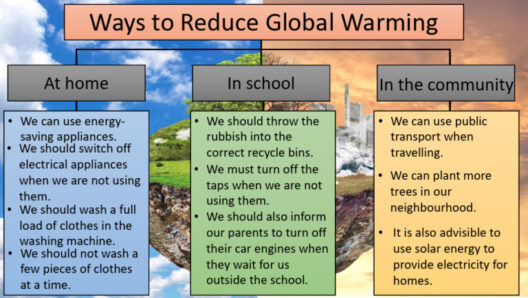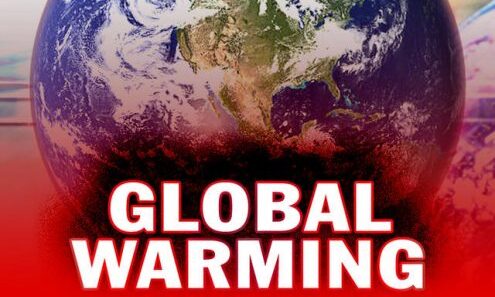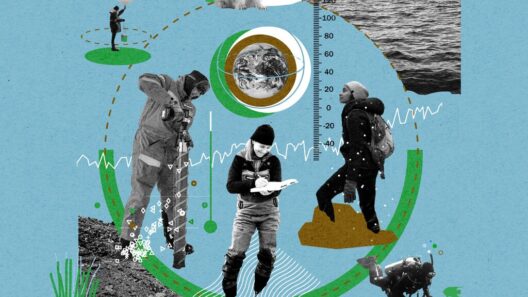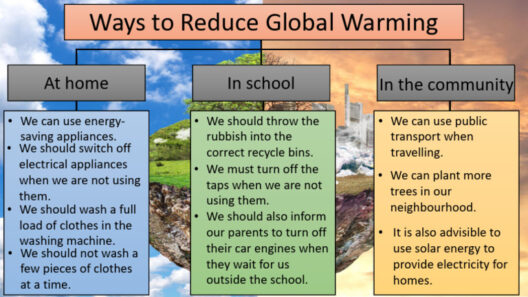Our planet is undergoing profound changes, and the specter of climate change looms larger than ever. Understanding the nuances of our warming world requires an exploration of how both actions and inactions contribute to this harrowing reality. While it may seem that individual actions are mere drops in a vast ocean of environmental challenges, each choice we make can resonate deeply within our ecosystems and socio-political frameworks.
Climate change, primarily driven by human activities—especially fossil fuel combustion and deforestation—results in a multitude of long-lasting effects. Glaciers are retreating, sea levels are rising, and weather patterns are becoming increasingly erratic. But the question remains: how do our daily choices intersect with these global phenomena? To truly comprehend the ramifications of our actions, we must acknowledge the interconnectedness of our actions across various spheres.
At the individual level, our decisions regarding transportation, energy consumption, and waste management significantly shape greenhouse gas emissions. Opting for public transport or utilizing bicycles instead of personal vehicles can substantively decrease carbon footprints. Yet, the repercussions extend beyond personal convenience; they signify a collective movement towards sustainable solutions. Furthermore, the choice to adopt renewable energy sources, like solar or wind power, illustrates a commitment to reducing reliance on fossil fuels. Each time a household opts for clean energy, it diminishes demand for coal and oil, further pressuring energy companies to shift their paradigms.
The significance of inaction in the face of climate change is equally weighty. Ignoring the call for change, whether through apathy or disbelief, allows entrenched systems perpetuating environmental degradation to thrive unabated. For instance, the failure to recycle or compost can lead to increased landfill waste, creating potent sources of methane—a greenhouse gas that is vastly more effective at trapping heat than carbon dioxide over a short period. Inaction thus complicates total ecological recovery, underscoring the importance of individual agency.
To complicate matters further, corporations and governments play pivotal roles in this intricate dance of cause and effect. The policies enacted—or neglected—by governments around the world have far-reaching consequences. For example, proactive governance that enforces stringent environmental regulations can lead to progress in sustainable practices. Conversely, resistance to such regulations can result in unchecked pollution and exacerbated climate effects. When corporations choose profit over planet, often prioritizing short-term gains, the consequences ripple through ecosystems and communities alike.
Yet, acknowledging the broader societal dynamics invites a deeper contemplation of community engagement. Communities that mobilize towards sustainable practices can forge remarkable transformations, showcasing the power of collective action. Grassroots movements flourish in the face of adversity, uniting individuals under a common purpose: to combat climate change. Initiatives such as community gardens, tree-planting events, or local clean-up drives engender a sense of stewardship toward the environment. This collective responsibility contrasts sharply with apathy—favoring proactivity over passivity and demonstrating how unity can overcome inaction.
Moreover, innovation within the technological realm fuels progress against climate change. The advent of carbon capture and storage (CCS) exemplifies technology’s potential to reshape our environmental realities. Implementing CCS technologies allows industries to capture and store carbon emissions, thereby mitigating their impact. However, the success of such innovations hinges upon collective support and widespread adoption; a hurdle often ensconced within political and economic complexities. Herein lies the paradox: advancing technology without adherence to responsible governance allows the subversion of global climate ambitions.
The urgency of shouldering this responsibility is paramount. Consider the implications of climate change on agriculture, biodiversity, and human health. With changing weather patterns, crop yields fluctuate dramatically, jeopardizing global food security. Ecosystems that once thrived with balanced climates are now under siege, leading to species extinction at unprecedented rates. Additionally, the exacerbation of respiratory conditions due to increased pollution and heat waves poses a severe threat to public health. These multifaceted crises further amplify the rationale that every individual action and inaction has tangible repercussions.
The narrative of our warming world is enigmatic yet alarming. To fully grasp its intricacies, one must peer beyond the immediate impacts and consider the broader consequences spiraling from simpler choices. From altering daily habits to challenging corporate practices, the onus lies on all of us. Engaging in informed conversations about sustainability can spark curiosity, prompting an examination of personal values and collective ethics.
In summation, as the earth’s temperature continues to rise, the potential for catastrophe lurks in the background. Yet the power of change lies within our grasp. Each action can precipitate waves of reform, while the inaction risks perpetuating the cycles of destruction. Understanding our world requires more than passive observation; it demands active participation in the fight against climate change. We must remain vigilant and determined, for every choice, however small, contributes to the larger narrative of our warming world. As this intricate tapestry unfolds, the message reverberates: every action, and even every inaction, matters profoundly.






